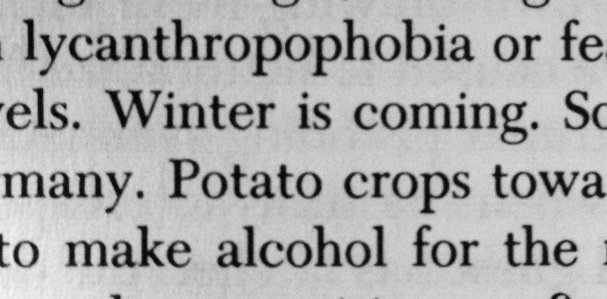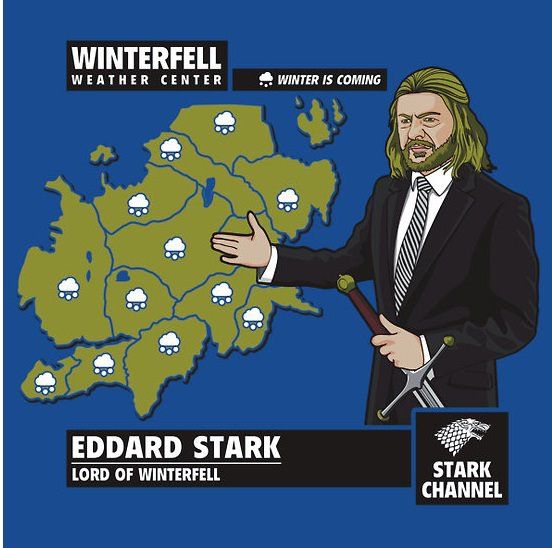
Sorry sorry sorry couldn’t help myself. From page 640 of Thomas Pynchon’s Gravity’s Rainbow.


Sorry sorry sorry couldn’t help myself. From page 640 of Thomas Pynchon’s Gravity’s Rainbow.

Arya Stark by Mustamirri/Anita. At deviantART; at tumblr.
 (You saw these last year, but they are still good. By Chris Bishop).
(You saw these last year, but they are still good. By Chris Bishop).
1. For context/overview/summary/brief review, read part one.
2. I’m about three-quarters of the way through Bring Up the Bodies, and have thoroughly enjoyed it so far. Rich and detailed, full of ideas and keen perceptions. Mantel posits protagonist Thomas Cromwell as one of the first English Renaissance figures—pre-Elizabeth, pre-Shakespeare. The big payoff of this reading is to see the machinations of a character whose grand task is to make the rest of the world’s ideals (and illusions of those ideals) fit with his own emerging plans for a more egalitarian and democratic world. This isn’t to say that Cromwell is always a nice guy—he can’t be, he has to keep spoiled King Henry happy—but he’s generally sympathetic.
3. Mantel’s Cromwell recalls to me Tyrion Lannister, my favorite character of George R. R. Martin’s A Song of Ice and Fire epic (I enjoyed the first three books very much). In his role as Hand of the King (chronicled this season on the HBO adaptation Game of Thrones), Tyrion faces the thankless task of protecting the people (common and royal) of King’s Landing through a difficult time. Like Cromwell, Tyrion is seriously misunderstood and even hated; he does great good for the “small folk,” yet they will never understand or credit him with these efforts.
Tyrion is also extremely shrewd and cynical, yet also honorable—just like Cromwell. Both characters must play the game of thrones (a game, Martin’s characters remind us and Cromwell equally understands, that you either win or die), but they do not play solely for their own gain. Sure, Cromwell is making boatloads of money from his gig as Henry’s chief minister, but he ultimately has the good of his family and the good of the English people at heart. He and Tyrion want the best for average, common people, and these characters’ humble origins have ensured that they actually understand the needs and wants of average, common people.
4. Why am I belaboring a Game of Thrones comparison? I don’t know. It’s just what’s running through my head as I audit the Bring Up the Bodies audiobook. I guess I think a lot of Martin fans would dig Bring Up the Bodies (and vice versa). Mantel and Martin both do an excellent job at showing the plotting and the scheming, the crafty intrigue that underwrites politics. Both writers have a keen ear for sharp, ironic dialogue, and both writers know not to tip their hands too much to the reader, instead letting the reader puzzle out the shady circumstances for himself.
5. Perhaps off track: Here’s a sketch by Vincent van Gogh of Austin Friars, where Cromwell lived:
.jpg!Large.jpg)
6. The thread of language that links Mantel and Martin in my reading is undoubtedly their sources: I am sure that when my ears perk to certain shared phrases (terms of heraldry, descriptions of a plague, “bedwarmer”), what’s really happening is that I’m reading through them, reading their origin texts.
7. Martin handles female perspectives in a patriarchal world with savage aplomb. His women transcend their limited circumstances (as well as the stock conventions that can beleaguer genre fiction). Mantel provides her own subtle critique of patriarchy in Bring Up the Bodies without tripping on historical reality. There’s a remarkable moment when one character—I don’t recall exactly who, but probably a member of Henry’s Privy Council—questions why God didn’t make women’s bellies transparent so that the important matters of succession, inheritance, and paternity might be made, well, clear to all. And while Anne Boleyn is hardly a sympathetic character in Bodies, keep in mind that we’re limited to Cromwell’s perspective. In Wolf Hall, Cromwell showed great concern for Thomas More’s wife and daughters, who were punished for (perceived) crimes that they had no possible agency in abetting. In Bodies, Cromwell shares similar concern for Jane Parker (among other women), wife of George Boleyn (Anne’s brother). Of course, Jane is going to help seal the case against Anne Boleyn for—
8. —brother/sister incest.
9. And yes, bro-sis incest may be lurid (lurid enough, I’ll admit, to get its own tidy spot on this list)—but it’s to Mantel’s credit that she never exploits the lurid attraction of historical reality (see: Showtime’s The Tudors); she doesn’t have to. That’s not Cromwell’s bag and it’s not necessary anyway. (Here is an obligatory sentence pointing out that one of the major plot points of Game of Thrones rests on brother-sister incest: One of the major plot points of Game of Thrones rests on brother-sister incest ).
10. I’ll end by sticking to Bring Up the Bodies but obliquely suggesting that everything I say about Mantel’s book could apply to Martin’s books, but I’m not going to belabor this post through example (we can chat in the comments section, should you care to, gentle reader). Here’s that ending:
11. Some of my favorite passages in Bring Up the Bodies have to do with Thomas Cromwell’s imaginative capacity,which Mantel channels with fierce brilliance. Cromwell taps into his past in order to shape the present into the future he envisions (an episode with an aging Portuguese knight is especially entertaining). In a few wonderful scenes (perhaps coming to fruition at game’s end?) he imagines a dinner he’ll host with all the courtiers he’s pushing around like pawns; the way he imagines their interactions at table helps him to determine his course of action (or inaction). But the most chilly episodes of imaginative capacity involve Cromwell’s own understanding that his unnatural death is probably a foregone conclusion. He’s too perspicacious to not see that eventually his favor with Henry can only eventually fail. But that’s for the future—for Mantel’s last book in this trilogy, I’m sure, The Mirror and the Light.
The AV Club interviews Kate Beaton, she of Hark! A Vagrant. Here, she talks a bit about A Game of Thrones—
AVC: You were a history major. Do you still read history for fun?
KB: I do, yeah. I pick up books every now and then. The only problem is, I pick up books and I don’t read them, because if I do reading, it’s for a comic. But I will. I will probably pick up the second half of John A. Macdonald’s biography, which comes out this year. [Laughs.] Because I think he’s a fascinating guy. [Macdonald was the first prime minister of Canada. —ed.] I read so much, but it’s always for comics, and there’s not much time in between to just settle down and start reading something for yourself. Recently, I started reading that Game Of Thrones that everybody was reading. It’s kind of a quick and fun read. And that was really nice, because I made time to read something that wasn’t for comics. Reading history for fun will turn my brain into, “How do you make this into a comic?” and then it turns into work. [Laughs.] There’s dangerous waters there.
AVC: I’d love to see the Kate Beaton take on A Game Of Thrones. And that’s at least somewhat less polarizing than politics. You do a lot of literary strips—would you ever consider one about contemporary literature?
KB: [Laughs.] Oh, no. No. I like doing literature that’s popular, that a lot of people have read or know about, so Game Of Thrones does fit into there. I did do a couple drawings and put them on Twitter, and they get good reactions. But I feel like, for a while, everybody was doing Game Of Thrones something or other, so I just sort of stayed out of there. And besides, you could hardly do a comic about that without spoiling it, because someone new dies every chapter. [Laughs.] It’s likeGame Of Massacres. And you wouldn’t want to ruin that for anybody.
